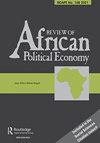笑到最后的人笑得最响:2021年赞比亚大选
IF 1.4
3区 社会学
Q1 AREA STUDIES
引用次数: 4
摘要
摘要大多数非洲主义学者都强调裙带关系在决定选举结果方面的重要性,以及世袭制和使用武力使执政党能够延长执政期的重要性。这篇文章借鉴了参与者对2021年赞比亚选举的各种观察和采访,为少数几项强调非洲政治中裙带关系和世袭制的局限性以及选民或下属团体追究其领导人责任的研究做出了贡献。它展示了赞比亚选民如何寻求从客户主义运动、世袭统治和工会运动中获得利益,以赢得国家政策的改变,在执政党行为者的注视下公开承诺互惠和忠诚,结果却让他们下台。本文章由计算机程序翻译,如有差异,请以英文原文为准。
He who laughs last laughs the loudest: the 2021 donchi-kubeba (don’t tell) elections in Zambia
ABSTRACT Most Africanist scholars stress the importance of clientelism in determining electoral outcomes and patrimonialism and the use of force in enabling ruling parties to prolong their stay in power. This article, which draws upon various instances of participant observation and interviews regarding the 2021 elections in Zambia, contributes to the few studies that emphasise the limits of clientelism and patrimonialism in African politics and the agency of voters or subordinate groups to hold their leaders accountable. It does so by showing how Zambian voters sought to secure benefits from clientelist campaigns, patrimonial rule and trade union campaigns to win changes in state policies, publicly promising reciprocity and loyalty when under the gaze of the ruling party actors, only to vote them out of power.
求助全文
通过发布文献求助,成功后即可免费获取论文全文。
去求助
来源期刊

Review of African Political Economy
Multiple-
CiteScore
3.00
自引率
7.70%
发文量
29
期刊介绍:
The Review of African Political Economy (ROAPE) is a refereed journal committed to encouraging high quality research and fostering excellence in the understanding of African political economy. Published quarterly by Routledge, Taylor & Francis Group for the ROAPE international collective it has since 1974 provided radical analysis of trends and issues in Africa. It has paid particular attention to the political economy of inequality, exploitation and oppression, whether driven by global forces or local ones (such as class, race, community and gender), and to materialist interpretations of change in Africa. It has sustained a critical analysis of the nature of power and the state in Africa.
 求助内容:
求助内容: 应助结果提醒方式:
应助结果提醒方式:


